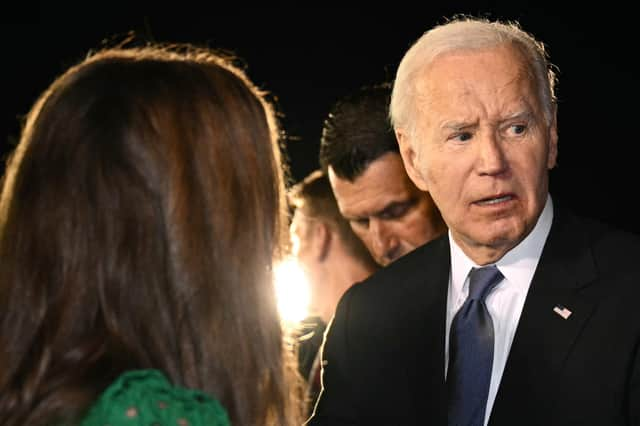This was quite a week in the annals of freedom of the press.
Julian Assange, the founder of the whistleblower organization Wikileaks, after being hounded by the US with the help of its sycophantic allies in the governments of the UK, Sweden, Ecuador and, most shamefully, his native Australia, for 14 years since his Wikileaks organization obtained and released documents proving systemic war crimes by the US in Iraq and Afghanistan, has been freed. He spent the last 14 years fighting efforts by the US to lock him up oar execute 9or even to assassinate him ,spending 12 of those years in the hell of confinement in a British maximum security prison and earlier seven years as an asylum seeker trapped in the Ecuadoran Embassy in London.
His asylum ended and his imprisonment in Belmarsh began when the leftist president who had granted him asylum from British authorities who wanted to hand him over to the US for prosecution as a spy, lost an election and was replaced by a right-wing president who cancelled his asylum and called in the London Metropolitan Police, who dragged him out of the embassy and into solitary confinement in Belmarsh Prison pending extradition to the US.
Over the seven years he was trapped in the little embassy, or left alone in a tiny cell in hellish Belmarsh, his supporters — initially a handful of journalists and his family — a father, a half-brother and father and attorneys in Britain and the US, and one attorney, Sara Gonzalez Devant, who later bore him two sons who have never met him except in captivity worked to build a movement to defend and free him.
It was a tough struggle. The US and UK media organizations that benefitted from his Wikileaks organization’s documentation of US war crimes, including the gun-sight video of a US helicopter gunship slaughtering, amidst audible mocking laughter, 11 unarmed Iraqis including two local Reuters journalists, and from other scoops Wikileaks received from whistleblowers, largely turned on him when he was being pursued by US prosecutors.
Typically these same news organizations, when covering his case, would repeat in their articles about him (almost as if pasting in pre-set macro paragraphs”), the false accusation that he was wanted by Swedish prosecutors for allegedly “raping” two women in Sweden. They also would routinely include in such stories gratuitous quotes from politicians smearing his character and even from fellow journalists questioning his claim to be one of them, along with grudging acknowledgement that the US charge of espionage against him was a threat to press freedom,
But truth gradually prevailed and pressure kept building: in Britain against his being extradited and against the US obsession with pursuing the case against him, and in Australia for the government in Canberra to end its years of submissive and callous acceptance of the abuse of an Aussie citizen by a US government out for revenge. This international movement to free Assange grew larger and more vocal when a new Labour government replaced the prior conservative one in Australia and Labor PM Anthony Albanese openly called on President Biden to end the case against his countryman Assange.
In the end it was this slowly and painstakingly developed international movement to free Assange that compelled the Biden administration to offer Assange a deal. He and his attorneys were reportedly told that the US would agree to his freedom if he would plead guilty to one felony count of theft of US military secrets (the evidence of war crimes), and a sentence of five years, which would be satisfied by crediting the over five years he had spent being held in Belmarsh Prison without conviction of anything but denied bail while fighting the US’s extradition effort.
Much is being made now, of course, by US officials of that guilty plea, but it is important that what Assange was facing if he were extradited to a court in Washington DC. With an indictment on 17 felony counts under the 1917 Espionage Act an one felony count of encouraging hackers and of helping NSA whistleblower Edward Snowden to escape to Russia, the total prison term if convicted on all those counts would have run to 175 years’ jail time served consecutively.
The urgency of the US plea deal offer, which apparently came as a something of a surprise to Assange and his defense team, had to do with the reality that the US was facing of his possible escape from their trap: That became at least a possibility when, after many rejections, two UK High Court Judges last year overruled a 2022 British Supreme Court decision denying Assange the right to challenge his extradition. Unconvinced by US promises that he would receive a fair trial in a US court (promises that were hedged by the US DOJ’s acknowledgement that the US Supreme Court would in fact be the final arbiter of whether, for example, Assange could avail himself of the Constitution’s First Amendment right of Free Speech and a Free Press — a Supreme Court packed with originalist justices who support the national security state. The two High Court judges were preparing to review his arguments against extradition later this month.
There’s no telling how they would have ruled of course, but the Washington nightmare of his walking free in Britain was more than Biden, AG Merrick Garland and the US national security agencies pressing for a lengthy jail sentence in the US, could tolerate. They needed at least the fig leaf of a guilty plea.
To understand why Assange, who is about to turn 53, after being effectively incarcerated for nearly a quarter of his life, simply for doing what investigative journalists do, revealing the truth about government crimes, it’s important to know what he was facing if he didn’t accept the Biden deal and then lost his last appeal of the extradition order that had already been approved in a UK court.
Let me explain.
In the self-appointed “Land of the Free and Home of the Brave” United States, those of us who as journalists cover legal issues know that American justice is not blind like the statue in many courts of the woman “Justice” blindfolded and holding up a scale in one hand and a sword in the other.. Neither is it fair. Worse yet, it routinely punishes those who demand their Constitutional right to a jury trial for doing so applying the stiffest of penalties should they end up being convicted.
The safest bet in an American court under such circumstances is to “cop a plea,” meaning to take the advice of one’s lawyer or public defender: typically to plead guilty to a lesser charge and accept a lesser penalty. or if that proves unacceptable to the judge and prosecution, agree to plead guilty as charged in return for a lesser penalty. This harsh reality has led to a large number of people in prison for crimes they did not commit, but that they pleaded guilty to out of necessity and lack of funds to hire a lawyer or to appeal a wrongful conviction.
That’s why for instance, of the 71,954 defendants facing criminal federal charges in the US fiscal year 2022, only 1669 opted to go to trial, according to a Pew Research report. That is just 2.3% of all those facing felony or serious misdemeanor charges that year. Of those few who boldly requested a trial before a jury or a district court judge, only a handful — 290 or 0.4% of those charged, were acquitted. The other 1379 who had their cases tried were convicted, and because they insisted on a trial they had a right to, likely were slapped with lengthy or maximum sentences. Of the rest of those who didn’t have their cases adjudicated, 89.5% or 64.434 just pleaded guilty hoping for a lighter sentence. Another 8.2%, or 5900 defendants, had their cases tossed out, usually for lack of sufficient evidence.
Given this sorry record, which is depressingly typical of how the federal courts operate year in and year out in the US, it’s understandable why Wikileaks founder Julian Assange, who finally escaped over 12 years of terrible torture at the hands of the US government and a supine British government, agreed to cop a plea.
Assange and his British counsellors also probably knew also about an investigative report published last year in the Italian newspaper La Repubblica, summarized later in a British publication called The Pen, which located copies of at least some of the long-missing or destroyed emails between Swedish prosecutors and Britain’s Crown Prosecution Service concerning the effort by a politically connected and CIA-linked prosecutor in Stockholm and the CPS, which at the time in 2013 was headed by none other than Barrister Keir Starmer. He’s the man widely expected to become Britain’s new Prime Minister if, as polls suggest, his Labour Party wins an outright majority and a six-year term as Prime Minister in the July 4 Parliamentary elections.
Starmer’s correspondence suggests it was his office that was pressing reluctant Swedish officials to keep insisting on trying to extradite Assange to Sweden to face questioning there about allegations of sexual abuse accusations by two Swedish women, and who advised them to reject offers by Assange and his attorneys to respond to their questions if they came to London and met with him. There had long been a question of why, Swedish prosecutor Marianne Ny, from 2010 to 2016, unable to question Assange in Sweden, refused a standing offer from his lawyers to travel to the UK and question him where he was holed up in the Ecuadoran embassy.
As the Italian newspaper Il Facto Quotidiano explains, “No one understood why Swedish prosecutor Marianne Ny did not want to travel to London to question Julian Assange and determine whether to charge him or not. It was our FOIA investigation that allowed unearthing the reason: It was the British authorities at the Crown Prosecution Service…who advised the Swedish prosecutors not to question Assange in London.” The magazine learned that all of the email correspondence by CPS officer Paul Close’s, who did most of the communicating with Ny was mysteriously wiped when he left the agency in 2014.
Starmer, who has been strangely silent about Assange’s plea deal with the US and his escape from British detention, was in charge of the CPS from 2008 through 2013 and during those years when the office was handling communications regarding Assange with the Swedish prosecutor and was Close’s boss, appears to have been a key agent in Assange’s unconscionable torment. That would clearly have made Assange and his defense team keen to get him out of Britain and out of the news cycle before Keir “our national security always comes first” Starmer were to enter 10 Downing Street as the UK’s Prime Minister.
The deal offered by the Biden Administration’s “Justice Department” was tough one. It required that in return for agreeing to plead guilty to one of the 17 felony charges of violating the US Espionage Act and being sentenced to five years in prison, a punishment which would be met by counting the over five years he has spent in solitary confinement in Britain’s dank and oppressive Belmarsh Prison fighting a US extradition petition, Assange would be able to fly home to his native Australia a free man.
Behind the scenes, one can see that the Biden administration, like the Trump and Obama administrations before it, has been vigorously doing the bidding of the US National Security State —the CIA,, the FBI, NSA and the Pentagon — in pursuing a major espionage case against Assange, the founder of Wikileaks, He and his organization had hugely embarrassed those agencies and the US government agencies over the years with the release of documents proving that the US was guilty of systemic and massive war crimes in Iraq and Afghanistan, was spying on the leaders of allies in NATO, and and Assange had also also helped NSA leaker Edward Snowden, another arch enemy of the national security state, to escape to Russia.
The US media happily ran page-one banner-headlined stories and videos of the US war crimes exposed by Assange and his Wikileaks organization. But then, when he was being indicted and hounded by the US government and was fighting his extradition to the US from a jail cell in Britain, those same media organizations just as happily stabbed him in the back, quoting slimy US politicians like former Trump VP Mike Pence claiming that his releases “put US personnel at risk.” (In fact the US, in its arguments in British courts seeking an extradition order, never could present a single case of a US soldier or CIA agent being put at risk, injured or killed because of a Wikileaks story or purloined document. Like the Swedish “rape charges,” all the smearing of Assange was and remains lies.
Establishment journalists too, in Britain and the US, have been guilty of shamelessly piling on in the tarring of Assange even as others of their colleagues, most of them outside of the mainstream news organizations, have heroically worked to debunk the lies.
The bottom line is that Assange in his struggle for freedom, has been heroically defending the freedom of all journalists and publishers around the world to speak truth to power. The indictment of Assange, a foreigner working outside the US, was nonetheless pursued by three presidents including Obama (whose Justice Department drew up a sealed indictment, but never acted on it), Trump, whose Justice picked it up and activated it in 2019, and Biden, who pressed forward with the effort to extradite Assange and have him face the Trump Justice Department’s indictment. All three presidents have sought to expand the reach of the already controversial Espionage Act to include journalists of any nationality operating anywhere in the world.
From its first use in the days of WWI, when the Espionage Act was passed to enable the government to arrest immigrants (usually anti-war leftists) on supposed spying charges, the act has morphed fairly recently under those three feckless presidents into a tool to go after not just alleged spies, but whistleblowers and the journalists who rely on them. Going after Assange just expanded its reach globally.
Some desk-bound pundits to whom the notion of challenging state abuse of power would never occur, are claiming that Assange, by copping a guilty plea, sold out his media colleagues. Nothing could be further from the truth. First of all, Constitutional scholars say that a plea bargain creates no new legal precedent in the federal or state courts of the US. Only an appellate court ruling of a Supreme Court ruling has such significance on future cases. (That’s not to say that just seeing what the US government and its willing puppet states in Europe are willing to do to those who do expose its crimes isn’t going to deter many from following in Assange’s footsteps.)
But in any case, no one who has not spent more than twelve years in enforced confinement has any right to criticize Assange for availing himself of the chance to get out of jail, to avoid the horror of a prosecution in the US legal system, and to join his family, including his two children, whom he has never met except in captivity.
As a fellow journalist, I can only congratulate him for his courage, to wish him well as he gets used to freedom again, and to salute all those who have worked for his freedom.
As my friend, colleague and fellow journalist Ron Ridenour, a US journalist/activist who has long ago abandoned his native US to live in Denmark, and who years ago cashed in his retirement savings and sent it all to Assange’s defense fund (he also reports giving $1000 to a Crowdfunder campaign to fund to repay the cost of the private jet Assange had to charter at a cost of hundreds of thousands of dollars to safely fly to his court hearing in Saipan in the Northern Marianas and on to the safety of Australia), says, “ I think Assange’s freedom is a huge victory. We the people all came together — not so much in the US, but in Europe and England and around the world. It shows that when a good number of people are willing to get together in the early morning in a cold rain we can make good things happen!” (In less than a week the fund had collected £441,793, close to the target goal of £520,000, a powerful demonstration of the support for Assange.)
Ridenour adds, “It’s a disappointment that the great journalist John Pilger, who tirelessly fought for Julian’s freedom, and Dan Ellsberg, and Center for Constitutional Rights President Michael Ratner, didn’t live to see this day.”
I think a headline on the BBC the day Assange walked out of a US district court in Saipan with the judge telling him he was “a free man” was on target, Referring to the years before PM Albanese called for his release, when Australian leader after Australian leader ignored Assange’s plight at the hands of the US, including even Labour PM Julia Gillard, who pointedly refused to lift a finger to help her persecuted countryman it read
Australia turned its back on Assange, Time made him a martyr.
The only thing wrong with the story topper is it ought to have said:
Australia turned its back on him, Britain tortured him at the request of US prosecutors, and America betrayed its own First and Fifth Amendments. Time made Assange a martyr.

Dave Lindorff is a Philadelphia-based journalist and columnist. He is a founding member of ThisCantBeHappening!, an online newspaper collective. Lindorff is a contributor to "Hopeless: Barack Obama and the Politics of Illusion" (AK Press) and the author the author of “The Case for Impeachment” (St. Martin’s Press). He can be reached at dlindorff@mindspring.com







